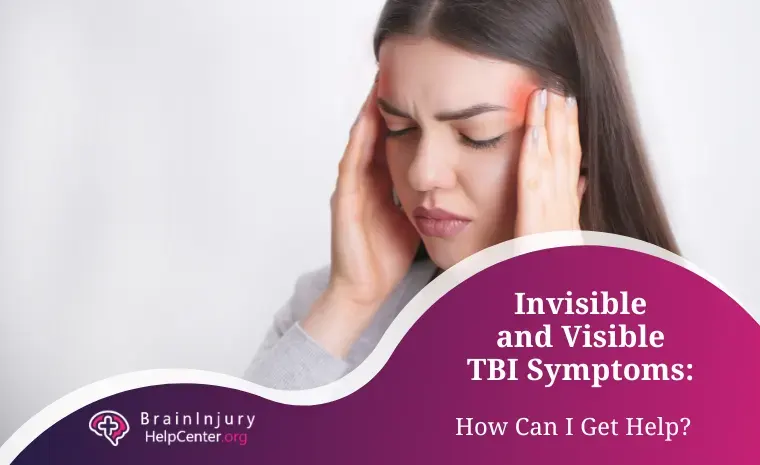According to the U.S. Centers for Disease Control and Prevention (CDC), traumatic brain injury is the leading cause of disability and death in America. About 80,000 – 90,000 TBI patients suffer from long-term disability due to their TBI annually, impacting their quality of life significantly.
Despite the frequency of traumatic brain injuries and the prevalence of persistent TBI symptoms, these injuries are often thought of and referred to as “invisible injuries”.
In this article, we will discuss:
- TBI as an “invisible injury”
- Visible and invisible TBI symptoms
- Why do TBI patients lack support?
- Helping TBI patients feel more visible
An “Invisible Injury”
Unlike a broken arm or leg, traumatic brain injuries may not receive the same amount of attention as other, more visible injuries. It’s easy to understand why injuries such as broken bones receive more immediate emergency medical attention.
Head injuries are not as evident as other traumatic injuries. TBI patients look the same as they did before their injury. However, the brain damage they sustained may be significant. Much of the damage on the inside unfortunately does not reflect on the outside.

Visible and Invisible TBI Symptoms
The extent of symptoms one may sustain following a brain injury is dependent on the severity of the injury, and the location in which the injury occurred. Some of the more common and visible TBI symptoms may include:
- Pupil dilation
- Vomiting and nausea
- Clear cerebrospinal fluid (CSF) draining from the nose or ears
- Loss of balance
- Convulsions or seizures
- Loss of consciousness
- Slurred speech
- Mood swings
On the other hand, many TBI symptoms are what one could consider “invisible” as these do not present themselves outwardly, and some patients may choose to suffer in silence or may be unaware of these symptoms. These symptoms may be any of the following:
- Blurred vision
- Ringing in the ears
- Changes in taste and/or sense of smell
- Sensitivity to light and/or sound
- Memory loss
- Difficulty in concentrating
- Profound confusion
- Slowness in thinking, speaking, acting, or reading
- Feelings of depression or anxiety
Individuals who sustain a mild head injury or concussion may only exhibit very mild symptoms if they exhibit any at all. It is common for individuals with mild injuries to disregard their injury and potential treatments because they feel that it may not be serious due to the lack of symptoms. However, an untreated brain injury puts patients in a dangerous position should they suffer a future concussion.
You may also find yourself wondering “Can TBI symptoms come and go?’. In cases of a concussion, it is possible for symptoms to come and go, making it difficult for these symptoms to be pinpointed. Among the treatment options for TBI patients, a medical provider will suggest cognitive rehabilitation therapy, among other forms of treatment.
Why Do Patients Lack Support?
The lack of visibility of TBI symptoms can cause friends and family to misunderstand or lack patience when dealing with someone with a severe injury. They may forget or take the severity of the injury less seriously because they may not notice some symptoms or may not be aware of them.
A common reason patients may feel a lack of support is due to feelings of depression or anxiety. Depression may be caused by chemical changes in the brain or a symptom of post-traumatic stress disorder. This is extremely common in cases wherein the injury was caused by an accident, such as motor vehicle accidents.
Depression is a common symptom after sustaining a TBI. About half of all patients who sustain a TBI become affected by depression a year after their injury, and this number grows as the years go on.
Despite more talk and acceptance of mental health conditions in recent years, there is still a stigma surrounding mental health. Some patients may feel uncomfortable opening up about their mental status because of a fear of a lack of support or understanding.
As previously stated, patients who suffer from a concussion or mild injury may not receive the medical care they need due to a lack of symptoms. Although moderate or severe head injury symptoms are more obvious, it is not uncommon for concussions to go unnoticed. In fact, about 5 in 10 concussions are unreported or undetected, as brain scans may not show an occurrence of a concussion.
Individuals who suffer from mild injury or concussion symptoms may also find that they are more susceptible to being convinced that their injury symptoms may go away in time. Some healthcare providers may fail to acknowledge the severity of their patient’s concussion.
Helping TBI Patients Feel More Visible
External validation is crucial when helping a TBI patient work through their cognitive difficulties. Having a strong support system significantly improves the rate of recovery of a TBI patient. A strong support system that legitimizes the patient’s symptoms helps them cope and makes for more effective treatments.
Along with external validation, friends and family members should make an effort to reach out and maintain social contact with the injured, offer their support, and strive to be good listeners. This helps TBI patients feel a sense of normalcy and shows support for their ongoing difficulties.
It is also advised for family and friends to learn more about injury characteristics, treatment strategies, risk factors, and clinical studies. More education on the ins and outs of severe brain injuries can help friends, and family members better empathize with a patient’s experience.
Above all, the most important thing a TBI patient needs when recovering from a TBI is acceptance of their injury and the symptoms and effects this may have on their life. A TBI patient must be able to accept that they may not return to normal activities as soon as they hope, and the recovery outcomes for people with TBIs vary from severity, injury location, and other additional factors.
With the right support from their peers and family members, patients will be able to cope with their medical condition in a safe and healthy environment and make a gradual return to their daily activities.
Get the Help You Need
Dealing with symptoms and long-term effects of a traumatic brain injury can be mentally, physically, and emotionally taxing. Learning how to navigate life after a traumatic event, such as a head injury from an auto accident, can significantly impact one’s daily living.
However, you do not have to deal with this alone. At California Brain Injury Help Center, we offer the resources, medical assistance, and legal aid to help you cope with your type of injury. Let us get you the help you need! Contact us for a free consultation.









